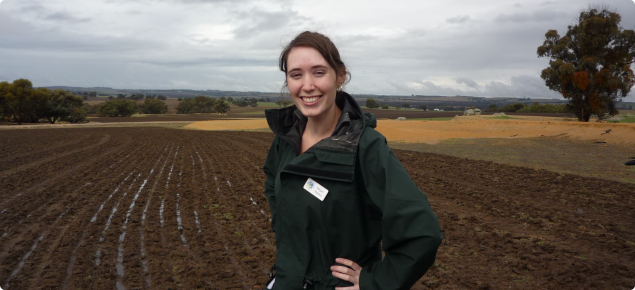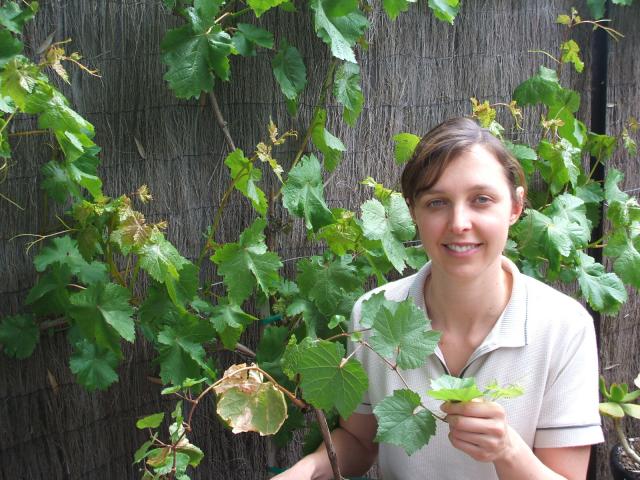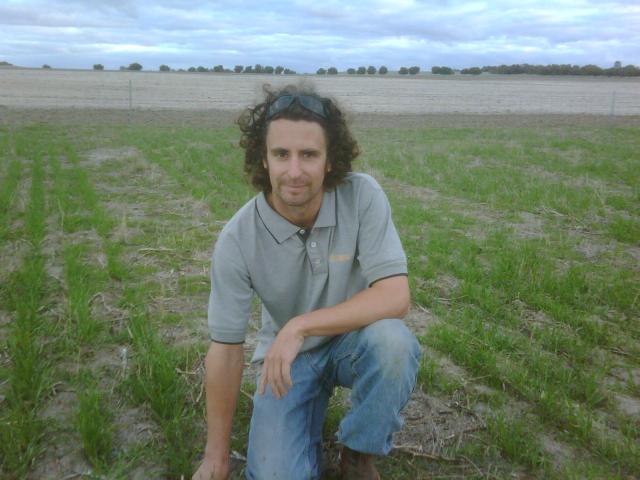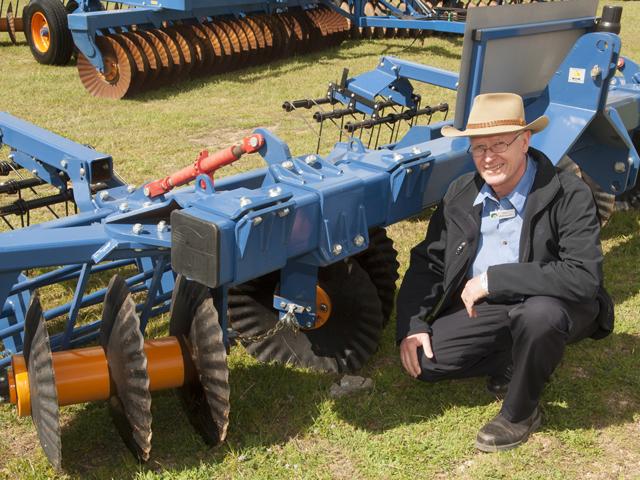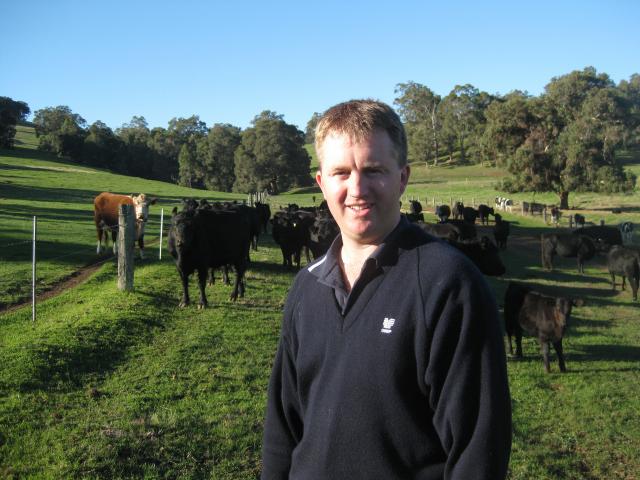Agriculture – a career for everyone
Do you want to work in an industry that is on the cutting edge of technology, offers opportunities to work all around the world and is vital to the future of humankind?
If your answer is yes, a career in agriculture may be what you’re looking for.
Agriculture isn’t just about working on a farm; there are lots of different kinds of careers within the food and fibre chain.
Whether you’re interested in managing people, working with animals, making new discoveries, protecting the environment, using your hands, your head or both – there are a range of career opportunities for you.
Explore some of the options below to find a role that is right for you.
Do you get a kick out of experiments?
Are biology, physics and chemistry your favourite subjects at school?
Do you want to make discoveries that can change the world?
If this sounds like you, take a look at Research it
Do you prefer being outdoors to indoors?
Do you like to work with animals and plants?
Do you like biology and science?
If this sounds like you, go to Grow it
Do you like to find ways to make things easier or quicker?
Do you like to be in charge and know what’s going on?
If this sounds like you, head to Manage it
If this sounds like you, go to Change it
Do you like solving problems?
If this sounds like you, take a look at Trade it
Research it
The agriculture industry is constantly evolving and is always on the lookout to find new and better ways of doing things.
As a researcher, you’ll be the one who makes this progress happen by making new discoveries and developing technology to help cope with climate change and support life on this planet.
What sort of things will I do in a ‘Research it’ career?
A career in agricultural research can take you to a lot of different places; from working outdoors in the field, looking through a microscope in the lab or following the weather patterns around the world.
Let’s take a closer look at three agricultural research careers.
Agricultural scientist
An agricultural scientist studies animals, plants and farm systems to provide information on productivity and sustainability to farm businesses and agricultural industries.
Some of the day-to-day tasks of an agricultural scientist include:
- collecting samples of crops, animal feed and soil and conducting tests in laboratories and greenhouses
- researching cultivation techniques, soils, insects, plants, crop production, pasture growth and animal breeding
- advising farmers and farm managers about better ways to produce crops and livestock, control weeds and pests, and improve farming practices
- developing procedures and techniques for solving agricultural problems and improving the efficiency of production.
To become an agricultural scientist you usually have to complete a Bachelor of Agricultural Science or Bachelor of Science with a major in Agriculture. For these university courses, you’ll need to complete complete a year 12 ATAR pathway.
For more information see Career Harvest - agricultural scientist
Meteorologist
A meteorologist studies the atmosphere to forecast the weather and provide information about our climate. Meteorologists are essential in agriculture as they provide information that can be used to protect and manage crops and livestock.
As a meteorologist, some of your day-to-day tasks could include:
- recording, analysing and interpreting information from weather stations, satellites, radars and remote sensors and interpreting this information for use by farmers and farm managers
- preparing weather forecasts using mathematical formulas and computer software
- researching and identifying climate change
- writing research papers, reports, reviews and summaries
- working in a team with physicists and engineers to develop observation equipment and distribute information.
To become a meteorologist you need to complete a Bachelor of Science or Applied Science, majoring in Mathematics, Physics or Meteorology, usually at Honours level. For these university courses you’ll need to complete a year 12 ATAR pathway.
For more information see Career Harvest - meteorologist
Agricultural technical officer
An agricultural technical officer collects samples and works with agricultural scientists to assist with research and testing.
Some of the day to day tasks of an agricultural technical officer include:
- setting up equipment and collecting samples from crops or animals so testing can be performed
- recording and interpreting information from experiments
- interpreting aerial photographs and preparing maps of soil and vegetation patterns
- assisting with the laboratory experiments to test the test plants, animals, soils and farming techniques
- researching and providing advice about various technical issues.
To become an agricultural technical officer you need to complete a Vocational Education and Training (VET) qualification in Agriculture, Horticulture or Animal Technology.
A university degree in agriculture or science with a major in agriculture may improve your chances at finding employment. For these university courses you’ll need to complete a year 12 ATAR pathway.
For more information see Career Harvest - agriculture technical officer
Where can I get more information?
If a career in research and agriculture is for you, find out more at the websites listed under 'External Links' on this page.
Grow it
Growing crops and raising animals is the backbone of the agricultural industry. If you love plants, animals and the great outdoors then agriculture has the perfect career for you.
What sort of things will I do in a 'Grow it' career?
There is a lot more to crops and animals than you’d think!
Studying growth and new cultivation techniques, feeding and housing, providing medical care, harvesting – a busy and rewarding career awaits you in agriculture.
Let’s take closer look at some 'Grow it' careers.
Botanist
A botanist studies all type of plants. In agriculture, botanists apply their plant knowledge to inform and improve crop cultivation.
A few of the day to day tasks of a botanist include:
• searching for and classifying new species of plants
• identifying plant specimens
• investigating effects of environmental factors on plant growth
• growing plants in glasshouses to assess significance of environmental and genetic variation
• studying genetics of plants using biochemical and molecular techniques in the laboratory
• preparing scientific reports and papers
• supervising and coordinating work of technical support staff
• working with other scientists to develop and improve techniques of plant cultivation.
To become a botanist you generally need to complete a Science degree, majoring in Botany, Biology or Plant Science. For these university courses you’ll need to complete year 12 ATAR pathway.
For more information see Career Harvest - Botanist
Agricultural veterinarian
An agricultural veterinarian specialises in diagnosing, treating and helping to prevent disease and injury in livestock such as cattle, sheep, goats, horses and pigs.
Some of the day to day tasks of veterinarian include:
• examining sick and injured animals and performing diagnostic tests to identify problems
• treating animals by using drugs, surgical procedures and nursing care
• vaccinating animals to prevent disease
• certify viability of animals for breeding and performance
• giving advice about animal health and care to owners and breeders
• advising on feeding and breeding strategies to achieve maximum production
• assisting in public education programs, promoting the welfare of animals.
To become a veterinarian you need to complete a degree in Veterinary Science and register with the Veterinary Surgeons' Board of Western Australia.
Murdoch University offers the only Veterinary Science degree in Western Australia. To get into this university course you’ll need to complete the year 12 ATAR pathway.
For more information see Career Harvest - veterinarian
Jackaroo/Jillaroo
Jackaroos (male) and Jillaroos (female) carry out a range of activities on cattle or sheep stations.
Some of the day-to-day tasks of a Jackeroo or Jillaroo include:
• mustering livestock on horseback or motorbike
• maintaining station equipment and repairing or replacing fences, gates and yards
• caring for livestock and treating minor injuries and illness
• assisting with light household duties
• using and maintaining vehicles and heavy machinery
• assisting with farming work such as cultivation and haymaking.
To become a Jackaroo/Jillaroo, you don’t need formal qualifications; however, general farming skills and experience would be useful.
You may be able to learn these skills on the job from experienced station owner.
Another option is to complete a Vocational Education and Training (VET) qualification such as a certificate in Agriculture.
For more information see Career Harvest - jackaroo/jillaroo;
Where can I get more information?
If a career in agriculture working with plants and/or animals is for you find out more at the websites listed under 'External Links' on this page.
Make it
Agriculture would be a lot more difficult and a lot less efficient without the machinery and technology we have today.
The people who design and build new farming technology and equipment are vital to the future of agriculture.
What sort of things will I do in a ‘Make it’ career?
Whether you’re interested in design information technology, food technology or engineering, you can find a career in agriculture.
Let’s take a closer look at some agricultural technology careers.
Agricultural engineer
Agricultural engineers study and advise on the use of engineering in agricultural production and management of natural resources.
Some of the day-to-day tasks of an agricultural engineer include:
• designing, developing and managing the building of agricultural machinery, equipment, instruments, irrigations, drainage and water control systems
• performing environmental impact assessments
• conducting research and study the results of work on farms and research stations
• preparing and presenting reports and advice.
To become an agricultural engineer you would usually complete a degree in Engineering. The University of Southern Queensland offers an engineering degree majoring in agricultural engineering. To get into these university courses you’ll need to complete year 12 ATAR pathway.
For more information see Career Harvest - agricultural engineer
Winemaker
A winemaker plans, supervises and coordinates the production of wine.
Some of the day-to-day tasks of a winemaker include:
• monitoring the quality of wine using laboratory tests
• organising the crushing and pressing of grapes, the settling of juice and the fermentation
• preparation of bottling wine
• supervising winery and cellar employees
• working with sales and marketing people wines meet market demands
• giving guided tours, conducting tastings and advising visitors about wine.
To become a winemaker you usually have to complete a Bachelor degree in Agribusiness with a major in Viticulture and Oenology or a Graduate Diploma in Oenology, both available through Curtin University. For these university courses you’ll need to complete year 12 ATAR.
For more information see Career Harvest - winemaker
Agricultural plant mechanic
Agricultural plant mechanics deal with the maintenance and repair of agricultural plant machinery and equipment.
Some of the day to day tasks of an agricultural plant mechanic include:
• diagnosing, overhaul, repair, tune, maintain and test agricultural machinery
• repairing and maintaining hydraulic components such as hoists, booms, scrapers, buckets and augers
• installing and calibrating systems in machinery
• using oxy, ARC, TIG and MIG welding, hand-fitting or machining processes to replace or repair faulty parts.
To become an agricultural plant mechanic you usually have to complete an apprenticeship in Agricultural Plant Mechanics.
You can start while still at school by accessing a school based traineeship – you attend school three days a week, spend one day at a registered training organisation and one day at work. Talk to your school’s Vocational Education and Training (VET) Co-ordinator to find out more.
For more information about this career see the Career Centre - plant mechanic
Where can I get more information?
If a career in technology and agriculture is for you find out more at the websites listed under 'External Links' on this page.
Manage it
Agriculture is a huge, global industry that depends on people with good management skills to make sure everything runs smoothly.
From leading multinational businesses, to being hands-on and in charge of a farm business, there are plenty of management careers in agriculture.
What sort of things will I do in a ’Manage It’ career?
A career in agricultural management doesn’t mean only working from an office. Careers range from agricultural economists who look at the big picture to lead farm hands who manage farm jobs daily.
Whatever your preference, agricultural management will give you the chance to put your people and leadership skills to good use.
Let’s take a closer look at some agricultural management careers.
Agricultural economist
Agricultural economists study and predict trends and changes in agricultural markets and provide advice on economic issues.
Some of the day to day tasks of an agricultural economist include:
• studying economic reports to stay up to date with economic issues
• conducting economic studies of livestock production, forestry, field crops, wool, cotton, fruit and winemaking
• undertaking research into factors that affect farm costs and market returns
• advising on the appropriate management of natural resources
• presenting research findings at seminars and conferences, as well as writing reports.
To become an agricultural economist you must usually complete a university degree in Commerce, Agribusiness or Agricultural Science. To get into these university courses you’ll need to complete year 12 ATAR pathway.
For more information about this career see Career Harvest - agricultural economist
Logistics manager
A logistics manager oversees the supply of goods and services from the point of origin to its final destination in the fastest, safest and cheapest way possible.
A logistics manager in the agricultural industry manages logistics within the supply chain which could include the transport of grain, livestock, produce and farm equipment and machinery.
Some of the day to day tasks of a logistics manager include:
• developing and managing long and short term logistics strategies for product
• making sure that effective administrative processes for freight and storage are established and implemented
• leading, managing and developing staff within the logistics team
• negotiating costs of freight and storage contracts with customers and suppliers.
To become a logistics manager you usually need to complete a traineeship in Logistics or Transport and Logistics.
You may improve your chances of getting a job by completing a Bachelor degree in Business, Agriculture or Logistics Management. For these university courses you’ll need to complete year 12 ATAR pathway.
For more information see Career Harvest - logistics manager
Farm manager
A farm manager is in charge of all cropping and/or livestock activities on a farm. Farm managers may own the farm or be employed by the farm owner.
Depending on the type of farm, some of the day to day tasks of a farm manager include:
• planning farming activities
• supervising other farm employees
• planting, spraying, harvesting and selling crops
• handling all aspects of livestock production
• recording all details about the farm operation
• planning the strategic direction of the farm.
You can become a farm manager without formal qualifications but training in farm management, crop management and/or animal husbandry are usually required.
You can get these skills by training with an experienced farm manager or by a Vocational Education and Training (VET) qualification in Agriculture, Agribusiness or Rural Operations through training institutes or agricultural colleges.
You can also complete a Bachelor degree in Agriculture or Agribusiness. For these university courses you’ll need to complete year 12 ATAR pathway.
For more information see Career Harvest - farm manager
Where can I get more information?
If you’re interested in a career in management and agriculture you can find out more at the websites listed under 'External Links' on this page.
Change it
Decisions we make in agriculture can have a huge impact on the lives of people all around the world - it could be just one change that creates the solution to world hunger.
A career to bring about change in agriculture is an important role that could see you making a difference to the future of many.
What sort of things will I do in a ‘Change It’ career?
Helping people, protecting the environment or animal welfare; there are many careers in agriculture where you can make a difference.
Let’s take a closer look at some ‘Change it’ careers.
Rural sociologist
A rural sociologist studies and provides information about development, social patterns and interactions of people in rural areas.
Some of the day to day tasks of a rural sociologist include:
• observing and investigating social groups and subjects such as family, community, education, industrial relations, crime, politics, minority and ethnic relations, poverty and mass communications
• researching, collecting and analysing data, usually using computers
• writing reports and journal articles
• interviewing people
• living in the community being studied to assist with understanding.
To become a rural sociologist you need to start with a Bachelor degree in Social Science or Sociology followed by post graduate studies.
For these university courses you’ll need to complete year 12 ATAR pathway. For more information see Career Harvest - rural sociologist
Environmental policy advisor
An environmental policy advisor guides the development and management of government environmental policies.
Some of the day-to-day tasks of an environmental policy officer include:
• updating existing environmental policies to ensure they are relevant and effective
• researching, assessing and compiling information regarding policy issues
• preparing briefs, maps, charts and report to presenting policy information to governments and policy makers
• advising governments and related organisations on particular social, cultural or political trends that may affect policy development
• come up with options to improve and update environmental policy.
To become an environmental policy adviser you can study a range of Bachelor degrees including Political Science, Environmental Science, Arts, Communications, Commerce and Law.
For more information see Career Harvest - policy advisor
Landcare officer
Landcare officers perform a range of tasks to maintain and restore native bushland, protect soils and rivers, and preserve biodiversity.
Some of the day to day tasks of a Landcare officer include:
• conducting research into environmental issues in the local community
• monitoring the condition of the local environment by observing water tables, rivers and soils
• devising and implementing strategies to overcome the issues or lessen their impact
• promoting community awareness environmental issues
• working with people from local government, land conservation organisations and the general community
• replanting native trees, shrubs, grasses and wildflowers.
To become a Landcare Officer, you need to complete a traineeship or Vocational Education and Training (VET) qualification in Conservation and Land Management.
You will need to complete year 10 to apply for these courses. Ask your school’s career adviser about the possibility of starting some of this training in school.
For more information see Career Harvest - conservation officer
Where can I get more information?
If you want more information about careers that make a difference in agriculture, you can find out more at the websites listed under 'External Links' on this page.
Trade it
Economic and business skills are put to good use in the fast-paced, commercial side of the agriculture industry.
Importing, exporting or providing advice — these are the jobs that make the food and fibre industry go round.
What sort of things will I do in a ‘Trade it' career?
Collecting and analysing data, negotiating prices and contracts, overseeing imports and exports, advising farmers on how to get the best return; there is no shortage of careers in the commercial side of agriculture.
Let’s take a closer look at some 'Trade it' careers.
Market analyst
In agriculture, market analysts collect process and analyse data to assist in the marketing of agricultural products and services.
- designing surveys and other tools to gather information
- collecting, arranging and analysing financial information from company records and government statistics
- predicting current and future consumer trends, such as changes in tastes and lifestyles
- writing reports on the results of research activities
- identifying specific consumer markets
- discuss information needs with clients.
To become a market analyst you usually need to obtain a bachelor degree in Commerce or Business, with a major in Marketing. For these university courses you’ll need to complete year 12 ATAR pathway.
For more information see Career Harvest - market analyst
Rural financial counsellor
A rural financial counsellor assists rural businesses and families in financial difficulty and works with them to develop plans and strategies to resolve their financial issues. Some of the day to day tasks of a rural financial counsellor include:
• interviewing clients to determine their financial status, discussing financial options and developing financial plans and strategies
• helping people identify appropriate and available government assistance
• negotiating payment arrangements with banks and financial institutions
• referring people to assistance services such as helplines, family support, personal counselling and community legal aid.
To become a rural financial counsellor you need to complete a Vocational Education and Training (VET) Diploma in Community Services (Financial Counselling).
For more information see Career Harvest - rural finance counsellor
Livestock buyer
A livestock buyer purchases the best quality stock at the best price for farm businesses, traders or processors. Some of the day-to-day tasks of a livestock buyer include:
• inspecting livestock in the field and sale yards
• using experience and knowledge to identify the most suitable livestock
• bidding for and purchasing livestock from auctions
• arranging transport for the livestock, whether it is to a farm, an abattoir, or to the wharf for live export.
To become a livestock buyer you don’t necessarily need formal qualifications but it may help you find employment if you have completed a Vocational Education and Training (VET) qualification— either a certificate and/or a diploma—in Agriculture. These courses are available through regional institutes of technology and agricultural colleges.
Having farm and livestock work experience may also assist you with finding employment.
For more information see Career Harvest - livestock buyer
Where can I get more information?
If a career in the commercial side agriculture sounds interesting you can find out moreat the websites listed under 'External Links' on this page.

